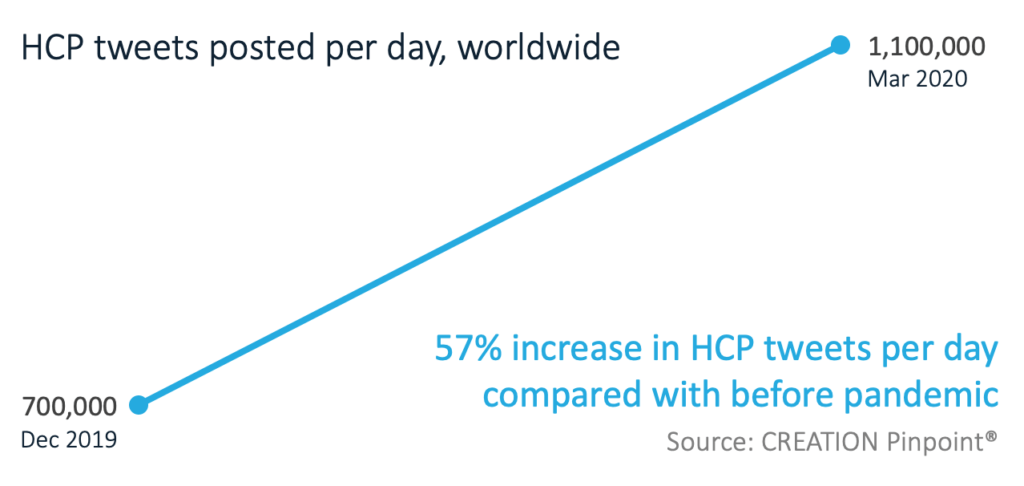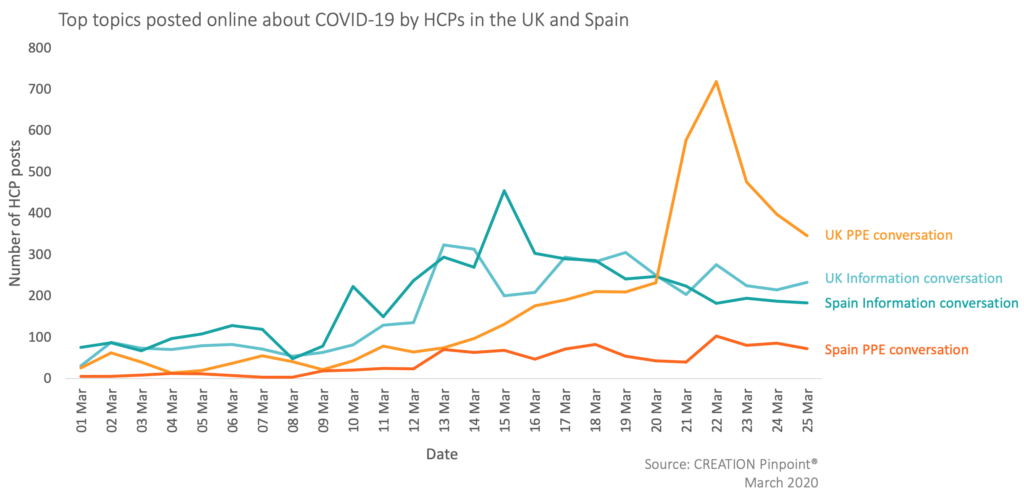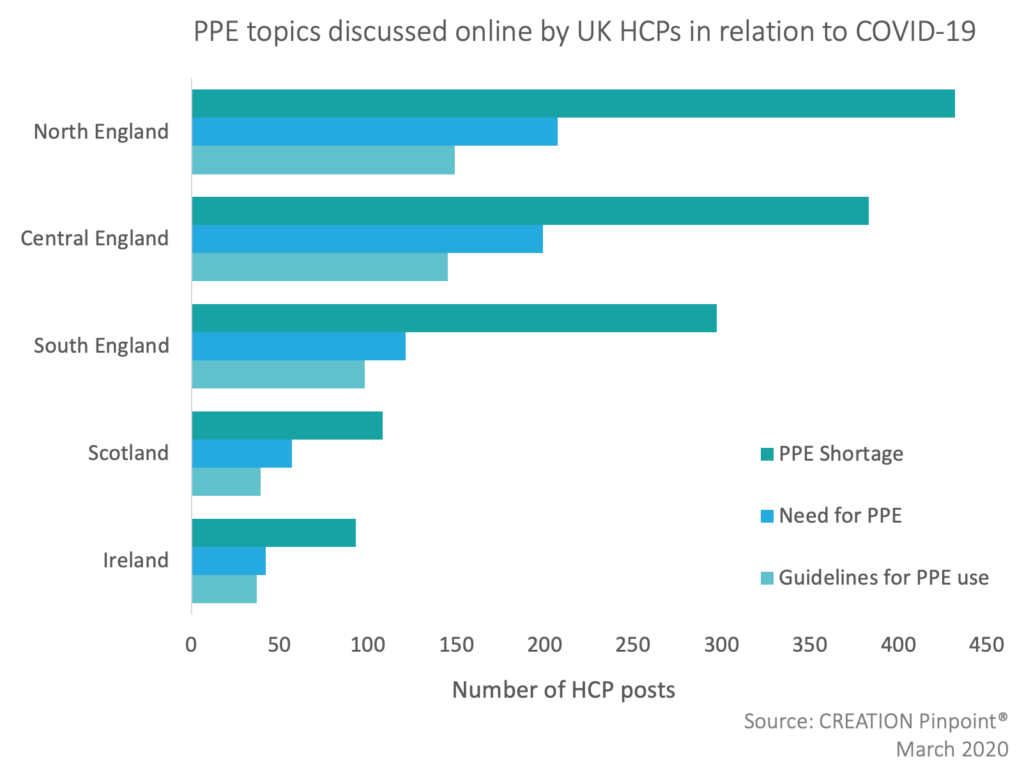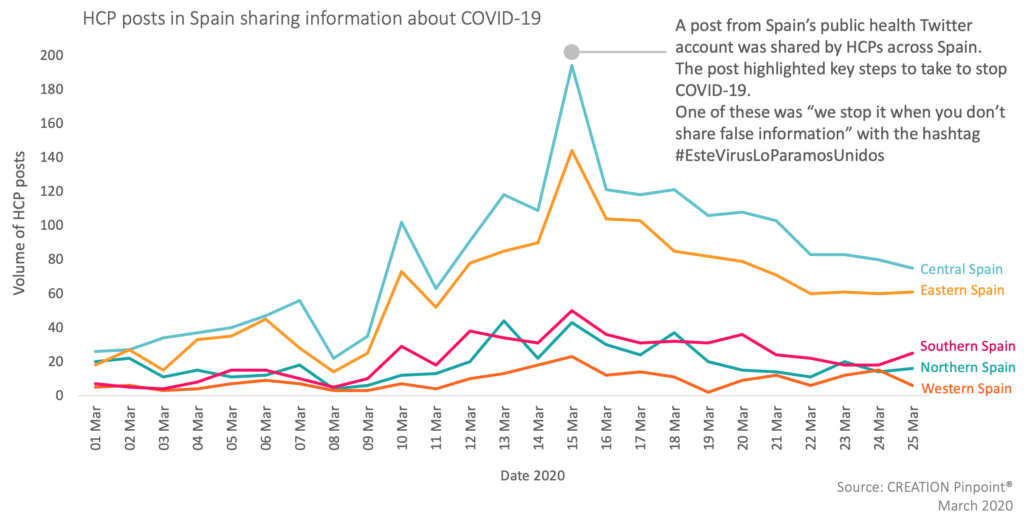Healthcare professionals (HCPs) across the world have, during this COVID-19 pandemic, increasingly taken to social media to share their experiences and ask each other questions. In our HCP only database, CREATION Pinpoint®, we have seen a 57% increase in tweets posted by HCPs per day.

We identified the key conversations that HCPs were discussing during March 2020 across the UK and Spain, and how these conversations were resonating across the regions. During this period there were over 130,000 posts from HCPs in the UK that discussed COVID-19, and more than 74,000 in Spain. Of this conversation, HCPs were in discussion around Personal Protective Equipment (PPE) and the spread of accurate information online.

Personal Protective Equipment shortage a concern for HCPs in the UK
HCPs in the UK were concerned about safety preparations for those who would be working on the front line. Many called out to the government in their posts to support them with the right equipment to be tackling the spread of this virus.
Dear @MattHancock what are you doing to protect GPs from coronavirus outbreak? Currently we have 2 masks for the whole surgery and no full PPE or training in how to use PPE. What will happen to our patients when we catch it?
— Alison J 💙 (@dralisonj) March 1, 2020
Across the regions of the UK, HCPs were discussing the PPE shortage. They were also highlighting their personal need for PPE and for more guidelines on PPE use. In the North of England, HCPs discussed the shortage more than the other topics and regions.

Many HCPs in the UK also called for adherence to guidelines for use of PPE but others shared confusion about what was the correct guidance to follow and whether these should be revised. As new guidance was released HCPs were unsure of which ones they should be following and called for a unified response.
Really important for the govt to hear this from @RCollEM@TheBMA@RCEMpresident @CNagpaul about the fears and confusion of front line healthcare staff amidst differing PPE advice from different agencies. https://t.co/CRunZSSFWi
— Adam Collins (@ASTC108) March 26, 2020
HCPs in Spain look to combat the spread of misinformation
🔸Lo paramos si ayudas y haces caso a nuestros profesionales
🔸Lo paramos si te quedas en casa
🔸Lo paramos si no te confías
🔸Lo paramos si viajas solo cuando es imprescindible
🔸Lo paramos cuando no compartes información falsa#COVID19 pic.twitter.com/2qxUV3tKXO
— Salud Pública (@SaludPublicaEs) March 15, 2020
While PPE was also discussed by HCPs in Spain, a much bigger ongoing conversation was of misinformation on the spread of COVID-19 and its treatment. HCPs in the central and eastern communities of Spain were combating this by sharing accurate and verified information online, often using the hashtag #EsteVirusLoParamosUnidos.

One particular source was shared the most by HCPs in Spain: articles from the New England Journal of Medicine (NEJM). HCPs in Spain asked their peers to share articles from the NEJM as a more reliable source than the “rumour mill” and may help to avoid “fake news”.
#ComparteNEJM #COVIDー19 @NEJM ha liberado todos los artículos que recientemente han sido publicados en relación al #coronavirus. Dadle difusión si lo veis oportuno (al menos, es una fuente de información más fiable que la rumorología)
Gracias @IbnRosa 👍https://t.co/kSuKFblcq5 pic.twitter.com/7WBgqqCK7X— Raquel Blasco (@RaquelBlascoR) March 17, 2020
La revista New England @NEJM ha publicado todos los artículos, series de casos, guías y demás contenidos relacionados con #COVID19 con acceso libre 👏👏
La mejor herramienta para evitar la rumorología y la información #fake 👇https://t.co/sH7TYIc4N0 pic.twitter.com/mMZMP64TzN
— Ángel Aledo-Serrano (@AledoNeuro) March 17, 2020
Each country and their HCPs, around the world have been facing mounting challenges and inconceivable pressure. Their increasing use of social media, shows their need for quick and easily available data and support from their peers and authorities.
Knowing HCPs’ concerns, how could we support them better?
During this time HCPs are facing potential challenges with quick access to relevant information and support from organisations with the increased pressure in their lives. It is more important than ever to know how to support HCPs better, whether you are in the pharmaceutical industry or another health organisation.
With the increase in use of social media we also see an increase in the “noise” online and this poses a challenge to not add further to that. Consider meaningful engagement with HCPs, providing them with the resources they need most right now in a format that is easily digestible. With the increased pressure in their work, time may be a factor of their willingness to engage. We’ve seen HCPs engage well with bitesize content; infographics and websites that have clear answers to their questions.
This is also a time to think beyond normal marketing priorities to show compassion and communicate on topics where HCPs need support. In a webinar we held recently about COVID-19, HCPs are engaging more with organisations and pharmaceutical companies than we have seen before. You can actively respond to their questions by creating timely content on what they need most, utilising the channels they are present on. You can engage during advocacy days to show support of the work HCPs are doing, and how you may be supporting their efforts right now.
Discover more
CREATION.co has been tracking the online HCP conversation relating to coronavirus since the start of the outbreak and is committed to supporting healthcare stakeholders globally. For more discussion about this research, and advice on health communications during COVID-19 in your country, please get in touch.

